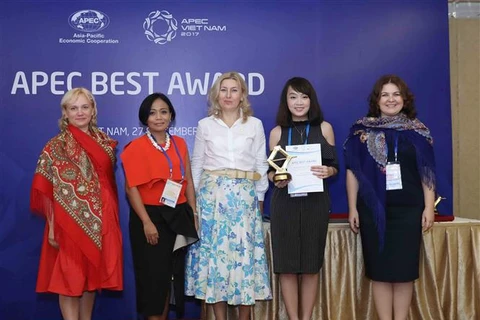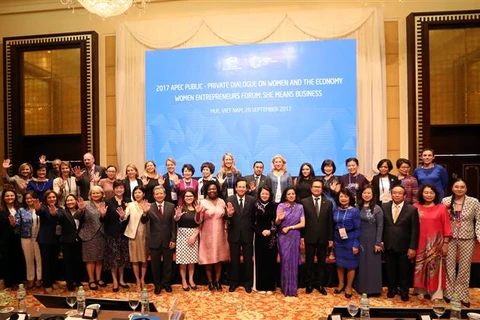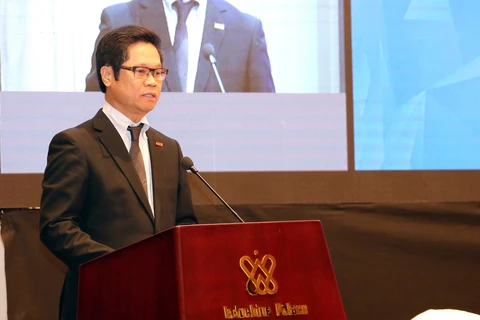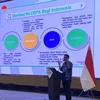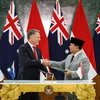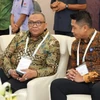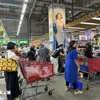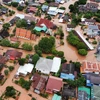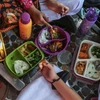Thua Thien-Hue (VNA) – The 2017 APEC High Level Policy Dialogue on Women and the Economy was held in Hue city on September 29, focusing on policy recommendations to enhance women’s inclusion and economic empowerment.
In his opening speech, Vietnam’s Minister of Labour, Invalids and Social Affairs Dao Ngoc Dung, chair of the dialogue, said almost three decades since its foundation, APEC has established itself as the biggest economic and trade cooperation mechanism in Asia-Pacific. It has also affirmed that gender equality is the centre of economic and human resources development.
Women’s integration and empowerment have significantly influenced the region, he noted, adding that many APEC economies have reportedly succeeded in reducing income and non-income inequality via progressive socio-economic policies. Therefore, inclusive growth and sustainable development is a common trend that member economies focus on.
Amidst global integration, investment in female workers’ skills and productivity needs to be considered a policy making priority. Most unpaid labourers are women, particularly in agriculture, and their access to development resources is very limited.
The official urged APEC economies to pay more attention to investing in infrastructure and public services as this will help reduce and re-distribute unpaid housework and care work. To do that, governments and businesses have to increase budgets for this work.
Aside from more financial resources, it is also necessary to improve women and girls’ access to infrastructure, he said, citing studies in many economies as showing that if 2 percent of GDP is invested in care services, especially social and childcare services, the number of jobs will rise by 2.4 – 6.1 percent.
Dung said as Vietnam and many other APEC economies are facing slowing economic growth, it is crucial to promote economic reforms and socio-economic progress. Strategies for promoting inclusive and sustainable growth will be key to poverty elimination, inequality reduction, and environmentally friendly development.
“There remain countless difficulties on the long path ahead. It may take us much more time and efforts. But I believe that with what we have, which are the energy, creativity, steadfastness and dynamism of each person, including women and men, girls and boys,… the APEC region will surely witness a brighter future,” the minister stressed.
During the one-day dialogue, ministers and heads of delegations of APEC economies are set to provide policy recommendations to enhance women’s inclusion and economic empowerment.
A statement of the 2017 APEC Women and the Economy Forum is also scheduled to be considered for adoption.
This forum has been held in Hue city, the central province of Thua Thien-Hue, since September 26. It is part of events organised by Vietnam throughout the APEC Year 2017.
Established in 1989, the Asia-Pacific Economic Cooperation (APEC) comprises 21 economies, including Australia, Brunei, Canada, Chile, China, Hong Kong (China), Indonesia, Japan, the Republic of Korea, Malaysia, Mexico, New Zealand, Papua New Guinea, Peru, the Philippines, Russia, Singapore, Chinese Taipei, Thailand, the US, and Vietnam.
They account for 39 percent of global population, 57 percent of global GDP and 47 percent of global trade, according to 2014 statistics.-VNA
In his opening speech, Vietnam’s Minister of Labour, Invalids and Social Affairs Dao Ngoc Dung, chair of the dialogue, said almost three decades since its foundation, APEC has established itself as the biggest economic and trade cooperation mechanism in Asia-Pacific. It has also affirmed that gender equality is the centre of economic and human resources development.
Women’s integration and empowerment have significantly influenced the region, he noted, adding that many APEC economies have reportedly succeeded in reducing income and non-income inequality via progressive socio-economic policies. Therefore, inclusive growth and sustainable development is a common trend that member economies focus on.
Amidst global integration, investment in female workers’ skills and productivity needs to be considered a policy making priority. Most unpaid labourers are women, particularly in agriculture, and their access to development resources is very limited.
The official urged APEC economies to pay more attention to investing in infrastructure and public services as this will help reduce and re-distribute unpaid housework and care work. To do that, governments and businesses have to increase budgets for this work.
Aside from more financial resources, it is also necessary to improve women and girls’ access to infrastructure, he said, citing studies in many economies as showing that if 2 percent of GDP is invested in care services, especially social and childcare services, the number of jobs will rise by 2.4 – 6.1 percent.
Dung said as Vietnam and many other APEC economies are facing slowing economic growth, it is crucial to promote economic reforms and socio-economic progress. Strategies for promoting inclusive and sustainable growth will be key to poverty elimination, inequality reduction, and environmentally friendly development.
“There remain countless difficulties on the long path ahead. It may take us much more time and efforts. But I believe that with what we have, which are the energy, creativity, steadfastness and dynamism of each person, including women and men, girls and boys,… the APEC region will surely witness a brighter future,” the minister stressed.
During the one-day dialogue, ministers and heads of delegations of APEC economies are set to provide policy recommendations to enhance women’s inclusion and economic empowerment.
A statement of the 2017 APEC Women and the Economy Forum is also scheduled to be considered for adoption.
This forum has been held in Hue city, the central province of Thua Thien-Hue, since September 26. It is part of events organised by Vietnam throughout the APEC Year 2017.
Established in 1989, the Asia-Pacific Economic Cooperation (APEC) comprises 21 economies, including Australia, Brunei, Canada, Chile, China, Hong Kong (China), Indonesia, Japan, the Republic of Korea, Malaysia, Mexico, New Zealand, Papua New Guinea, Peru, the Philippines, Russia, Singapore, Chinese Taipei, Thailand, the US, and Vietnam.
They account for 39 percent of global population, 57 percent of global GDP and 47 percent of global trade, according to 2014 statistics.-VNA
VNA

